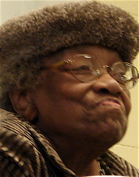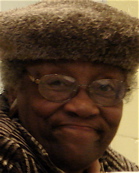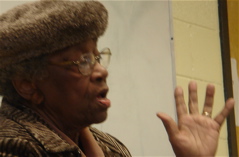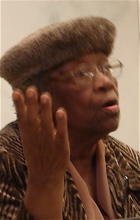
Home ●
Where We Meet ●
News ●
Announcements ●
Events ●
About Us ●
Contact Us ●
Search ●
Morning
Breakfast
Forum
Charlotte, NC
www.tueforumclt.org
March 20, 2007
Overcoming barriers to health for all
The woman who was among the first black nurses to integrate Charlotte-Mecklenburg's public health system grew up playing on a pile of asbestos waste.
 Thereasea Elder, now 80, was 5 when two younger siblings died
from exposure. She says she carries a damaged lung today from her days growing
up next door to a Charlotte asbestos plant.
Thereasea Elder, now 80, was 5 when two younger siblings died
from exposure. She says she carries a damaged lung today from her days growing
up next door to a Charlotte asbestos plant.
But it was not the public health hazard that she knew only too well that shaped her life's work protecting the public health. It was, she told the Tuesday Morning Breakfast Forum Tuesday, watching a neighbor walk to the bus every day dressed in the white uniform of the nursing profession.
Elder's comments Tuesday ranged from health conditions in Charlotte to the inequities experienced during the first years of integration to her dreams of opening in Charlotte a hands-on musem of African-American contributions to the community. Excerpts:
Ending racial barriers
"White nurses always, always visited black homes and did what they wanted to do in that home. We could not visit white homes. I learned later that the federal government said, integrate or no money, but we weren't told that. We were told if we wanted to integrate we had to make the plans, and they put us in what I found later was the worst part of Charlotte: They put us in the Ku Klux Klan territory to start this program. And it was a great challenge.
"I wore every stitch of my uniform -- my cap, my uniform, and my little nursing bag-- to let them know that I was a nurse, here to help.
"When I first went out, I was introduced to the caseload that the white nurse was carrying.... And Confederate flags were hanging in the homes from the ceiling down, and the houses had no numbers on them. You had to go to the local pub to find out. When I got new [clients], I had to go to the local pub -- you know, that's where they do the beers and stuff -- I had to go there to find where these people lived.... They would say to me, that's a white family, and what does a nigger like you want with a white family. I'd say, they sick -- sir -- I need to see them. After that, things went pretty smoothly.
"Some of the patients I inherited said to me, after I'd been going some time, she'd raise that pillow up and say, Miss Elder -- and she did say Miss Elder -- and she'd show me that big gun and say, the first time you hurt me I'm gonna kill you. I had others that would show me knives and such. I had one little family. They were the nicest little family, but every time I walked in to give her her B12 shot, she'd say, be sure to wash the dishes and empty the garbage....
"When I went to the health department I made a salary that was below the white nurses' salary, although it was government and we were supposed to go in at the same price making the same money, and that never occurred.... It was told to us that they [whites] lived in different communities and it was much more expensive for them to live...."
Unequal, but not separate
"I had already been changed to know the challenges between African Americans and whites. I had gone with my mother to work in the house. She was a maid. My daddy worked at Myers Park Country Club and I had gone out there. My brothers went out there too, during golf tournaments. And they [parents] talked to us. It was six of us. And we knew.
"The white people that they worked for, they were crazy about us. All of us went to college because of them.... They saw to it, and that was just the most wonderful thing, of mixing and knowing. And that's the way it was with all African Americans: Whomever they worked for, they cared for them. But they did NOT care for the people who lived next door to you. They took care of their own, they really did. I was cared for all through my nursing [education] sending me money and things and clothes. And I can never thank them enough. They were always at our house. We got hand-me-down clothes and things like that from their children."
Playing hardball
"The black supervisor got on board because of Bob Walton. Bob Walton was a county commissioner. We had a new director to come in... Dr. Delta wanted to combine some things from Social Services to the Health Department and it wasn't going right, so he called me in and asked me if I could get to Bob Walton and some other prominent African Americans that he could talk to. I said yes, so I went to Bob Walton and said, you all are getting ready to give him something and we need a black supervisor. Please get us a black supervisor.
"It didn't matter [who], just so
she was a black supervisor that would be in staff meetings and we would hear
and have all the information that other people would have. But they had
their methods for that too: They had meetings outside, even after she was a
supervisor. She was not in on all the things."
 Altogether
too open
Altogether
too open
"Some of the other incidents that was really hallelujah, after a year of this pilot program, and we had restructured everything and we were back in teams and we were mixed teams... nurses were doing total health care in the home. And these were ... things we were not allowed to do before.... I got switched from this side to southeast Charlotte after the pilot program. We're going to give you a rest, you know. All right.
"My first patient was a little old
lady with a son. She and her son lived together, and he was a flasher. The
minute you'd open the door, that's what he did. And I told her, it's even
funnier, what you got, that ain't nothin'... But it didn't matter, every
time I would see his mamma, but if it made him feel better, that's alright.
It was really a challenge."
The white uniform
"I wouldn't take anything for my
journey in public health, and all of my life. From Day One, I would sit on
my doorsteps in the Greenville area and I watched this lady walk and go to
the bus line to get the bus. She had on a white uniform and I thought she
did everything for sick people."
Living around asbestos
"And that's what I wanted to do, to make things much easier for humanity, because I had lost a sister and a brother at a very early age. I was 5 and they were younger than me when they died. They died from asbestos. I lived on Hamilton Street and the Southern Asbestos, the windows faced our homes. And every single day they had the windows up. We had to clean off the screens of asbestos. We were reared in that stuff. I have an asbestos lung today. There are people that have died from these sorts of things also.
 "When
they found out how poisonous the asbestos was, even the asbestos in the
buildings, there was a whole generation of people that was in that area that
lived with that. They grew up with that. And most of us have gone, with
lungs, heart, these sort of things. We were totally exposed. Everybody that
worked in that plant came out, we always thought they had TB, because they
were all long, lanky, thin, coughing all the time, and all of them smoked.
After they found out, and established the asbestos program in North
Carolina, they closed that place.
"When
they found out how poisonous the asbestos was, even the asbestos in the
buildings, there was a whole generation of people that was in that area that
lived with that. They grew up with that. And most of us have gone, with
lungs, heart, these sort of things. We were totally exposed. Everybody that
worked in that plant came out, we always thought they had TB, because they
were all long, lanky, thin, coughing all the time, and all of them smoked.
After they found out, and established the asbestos program in North
Carolina, they closed that place.
"I still worry about it because
they have houses built there [in Greenville] and to my knowledge they never
cleaned up the ground. The asbestos put their waste out, and it was higher
than any of the buildings. We used to ride down their waste on pasteboard.
That's what we played in. There was also a spring, and back then people got
water out of the spring. And we had the best time in the woods where we
would "cook" and have fun and play. It was a wonderful, wonderful childhood.
I don't regret any journey that I've been on."
Dream of a hands-on museum
I just regret that I have not been
able to fulfill a dream of mine, and I'm still working at that. I would love
to leave... an African American hands-on museum because of the contributions
that African Americans have made to Charlotte-Mecklenburg. I have
established a women's hall of fame. If you know the atrium at West Charlotte
[High School], that is a dream that I have. We have established a marker in
the oldest black park here called Pearl Street. The park in Rockwell in the
university area is named after me, but Pearl Street is the first black
registered park. There's a marker down there. If you push there are spots
telling you about the integration of the school system. It tells you about
how the park came about. This was done by Steve Crump and Mike Cozza. There
is also a marker outside Bank of America Stadium commemorating Good
Samaritan Hospital. Trying to talk about the things that we have done I
would love that...."
Asked if her experiences with racism embittered her:
"No, I am not bitter at all. I thank God every day for the experiences I have, for I am a better person, and I pass that on to anybody else. I love everybody. I can remember, I had one little girl in the school system, she was a precious thing. Her father and mother were deaf, and her whole world was touch. When she came to my school, that was her method of communication. And these [parents] were some wonderful people, because they went back and forth to New York to the stock market. They were some well-to-do white people.
 "And
she had a white teacher that could not stand that child. She couldn't stand
that child coming up to touch her to get her attention. That was all the
child knew. She would be in my office and hallucinate. Big rabbits. These
things that were hunting her and she would be under the table. I went to my
principal and I told him that child needed to be moved out of her room. And
he wouldn't move her. And so I went to my supervisor, and I told her what I
was confronting. When I would go to that school I had to comfort that child.
She was hallucinating and it was terrible and nobody was doing anything
about it.
"And
she had a white teacher that could not stand that child. She couldn't stand
that child coming up to touch her to get her attention. That was all the
child knew. She would be in my office and hallucinate. Big rabbits. These
things that were hunting her and she would be under the table. I went to my
principal and I told him that child needed to be moved out of her room. And
he wouldn't move her. And so I went to my supervisor, and I told her what I
was confronting. When I would go to that school I had to comfort that child.
She was hallucinating and it was terrible and nobody was doing anything
about it.
"So my supervisor said, well, it's a school problem. I said wait, let me tell you something: If y'all don't do somethin', I'm going to the newspaper. I'm going to tell this story, because I'm not going to have that child -- and I raised so much sam my supervisor said, OK Thereasea, I'm coming over to your school to see what we can do.... When she saw the child was white, she said Thereasea, why were you so excited about a white child? And I said, for your information, I love everybody.
"Color? I never saw color, when we were with the soldiers, whatever. It doesn't matter. It didn't matter. And it never will matter to me. I love people, and if I can help anybody, that's my motto. And the challenges you face, I know God is with me on this journey and wherever I end up, it's with Him."
--------------------------------------------------------------------------------------------
The Forum welcomes all persons to its meetings
beginning at 8 a.m. most Tuesdays of the year
at the West Charlotte Recreation Center, 2222 Kendall Drive, Charlotte, NC
down the hill from West Charlotte High School.